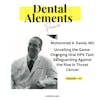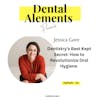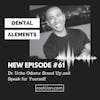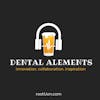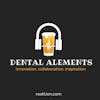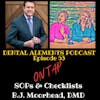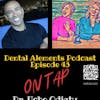
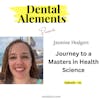
In this episode, we dive into the captivating journey of Jasmine Hodgert as she pursues her master's degree in health studies and passionately advocates for healthcare.
Jasmine shares her personal story, unveiling the motivations behind her fascinati...

In this episode, we dive into the captivating journey of Jasmine Hodgert as she pursues her master's degree in health studies and passionately advocates for healthcare.
Jasmine shares her personal story, unveiling the motivations behind her fascination with advocacy and its deep connection to the world of healthcare. Her dedication to expanding her knowledge and expertise in the field shines through as she expresses her excitement about pursuing a master's degree in health studies.
She finds immense intrigue and fulfillment in advocating for others, particularly those who may have never received proper dental care. Concerned for caregivers who may lack the necessary knowledge or resources to provide adequate dental care, Jasmine voices her hope for change in this area. She emphasizes the urgent need for improved education and support for caregivers, ensuring that proper oral care reaches those who need it most.
We hope you enjoy this bonus episode!
Tell me about your project that you're doing. So , you're doing Masters.
Yeah, I'm going for a master's and health studies.
Okay. And then your plan is for advocacy. That's your passion.
That's what I found the most intriguing. Yeah, I love that too. I loves actually. That's
one of my big passions.
Okay, that's in every other people.
Sorry. Say and in that for other people like, yes, I've seen way too many. Three-year-old little girls come in. I'm embarrassed to smile because they have never gotten Dental Care before in the all the teeth are bummed out. Or I used to be a caregiver. And I would see elderly people, and nobody was brushing, their teeth, adequately. And I mean, I have elderly come into my office, and I'm always concerned that the caregiver may be isn't willing, or doesn't have the knowledge to properly give treatment to
their other early.
So, I would really like to see that change. I mean, I know there was a whole bunch of people in between between that that didn't need help. But that's some of the bigger, like things that I've been concerned about.
, in school. We did our project on vapp
Okay,
ventilator Associated pneumonia. So we did a project on that learning so much about that. Yes, because the bacteria in your mouth and then you're putting ventilators in elderly or sick, people in the hospital and then the bacteria is actually causing ammonia and can,
you know, be deadly, unfortunately,
but nurses aren't trained either. I mean, they're not there to brush your teeth, but it's bacteria
and so many times you go to the doctor, right? And they don't look in your eye. Mouth. I hope your teeth and they don't understand that. There's so much you can learn, you know, by looking in someone's mouth. Yeah, I mean, I can pretty much tell if somebody's got high cholesterol like if they're
on that time of the month or their stress sore, like
by the blood to like if it's
if I go to probe or do measurements and then
there's like a thin blood like a thinner, any blood and they're sick or blood and it's like, so your mind the whole time. You're kind of like yeah, you're doing the numbers but you're like, okay, like think of the their health history, it's all going to your head of trying to put things together and
and then as I don't hear these ideas from people and sometimes you're like, oh maybe you have a vitamin deficiency. And if you see somebody with a sore on her mouth, you know, the corner of the mouth, nice turn eyes
or I can use, you know, unfortunately, HIV and other things as well, things that they might.
, not even a clue that they need to be best if Lori I issues. I mean, doing the training on oral mild facial, like the way your teeth occlude, and the way, you chew
does so many different things to your g.i., because this is where it starts and penises.
Yes, yeah, this is the
beginning of the digestive system right here.
Uh-huh. And what you put in there,
Yeah, cutting up your food, really small. Eating the right Foods, it makes a difference
and that's one thing in the oral. Facial. Malfunctioning therapy training as well. They teach you
like to give a baby a whole apple or to give him a chicken leg, , , , you can't bite off more than you could chew because your mouth this little. So, we're going to take a little bite, so it's going to be appropriate to your size,
but as parents, you know, we're so afraid of choking that. Chop everything up and grind everything up. So then there they don't learn how to chew and develop those muscles either and swallow properly. And so talk about the helicopter parenting right.
You think you're doing the best and loving your child but really you're hurting the natural process. So
it was really interesting. I totally am going to take those classes now because I mean, I would never even have thought about it. Like that, like, oh, I'm heading up my kids food too small.
, . Yeah. You can't win Kenya.
so you want to advocate for seniors and then children like that telling, you know, talking to parents parents, don't know this, right?
I worked on the front office of the dental office for, like 10 years, we went before I went to hygiene school.
And that would hygiene school. we learned that , carries is an infectious disease? I'm like, what I did not even notice my work on the Dunlop. I know. I like I didn't know this was an infectious disease,
most people in the front office, I feel like as a hygienist, we get complacent were like, oh, there's a front office, they work with dental, they know these things, but I am temping and I go from facility to facility and sometimes I'll clean the teeth of the front office person.
Or people and I'll start telling them the things that I would tell, tell regular patients because
I realize they don't, they don't know. Why would they know?
They didn't go through medical training. Why would we assume that they know?
But it's just like such a normal thing. I feel like that
as hygienist. We just assumed everyone in the facility knows what's going on with teeth and
Right. Exactly.
I mean even dental assistants don't have a full comprehension that the dental hygienist get because they didn't take the same kinds of classes. That's why we're dental hygienist and their dental assistants. . And we don't know some of the things they know . , . the background
of things that you learn are just totally different and
we take them for granted because it's just in there. Now It's embedded in us and we were looking at something. We're thinking of all these things, like we were talking about, but doesn't necessarily mean that that person knows what your Looking at for you need to tell them. Okay, so okay, so tell me a little bit more about your journey. Let's talk. Let's talk about you You started head unit, I chance:, where did you start someplace else, or did you discover? I just got out of high school. I went into the military and I worked on Jets and I worked on the engines and I did a lot of things. In the military. But I never even remotely got close to the dental field or medical field. I saw a girl get her front teeth knocked out by an F-18 jet ladder and one because if you're short you can't put the ladder up very well. You have to like jump and it came back, not after two front teeth out and they stayed up all night to make her new front teeth. So she wouldn't have to walk around without her smile and I was like, that's what I want to do. I want to give people Their smiles back. Yeah, so I got out of the military after my four years and I went to school in Texas, I started off in Texas because Texas women university has a really good dental program. It's like was like the top five.
I didn't want to necessarily go back to the West Coast organ where I'm from because I wanted to get my schooling out of the way. I didn't want to kind of put my foot in kind of play with my Friends. I wanted to get it done and I went two years in Texas and I was like, I've got to go home, I needed support system.
So I went home, I got into dental hygiene program and then I
got my life and
and then I fell in love and moved to Florida. So I went to school, graduated in Oregon and then flew to Florida. Almost immediately. Okay, she came back for a little bit, which part of Morgan did you live in?
I was in the Portland metro area for the most part. Okay, yeah,
yeah. Me too. I thought I was boring, and, and Portland area, but now I live in Scappoose. Do small town outside of Portland, which you find out where that's at by Sauvie Island.
And so so you're in the military which branch were you in
the Navy? Okay, so you're on the
ship's,
they are
- and the Nimitz. It's a they're both aircraft carriers, huh?
That's exciting. Well, thank you for doing that. That's, that's awesome.
Yeah,soalotoffun.
so you've been in hygiene just as 2020, tell me what it was like being in school, right? You're in school and covet hit, what was that like?
And you're not right with me, graduating and everything kind of shut down. Down. And even though we were trying to still take classes trying to finish up the year,
we really couldn't
because we needed the clinical side of things. So, when clinical side of things started to open up which we had to like fight for,
we finally start doing clinical, not really people
wanting to come in and we had to take our boards and you Couldn't have patience for boards,
which
almost all states are required to have a patient for your boards. Honestly, Florida is one of the harder states to get
your hygiene license. Because there's lots of people that come from other countries and so they were having issues with getting people to have the same standard of care
And so they made it really strict for getting your license here. But luckily they for like small time period, let us do the
mannequins which is nothing like we practiced, the mannequins do not have teeth like ours. It's like this soft material in your like
removing the soft material because you're like, well, this isn't what a tooth feels like, so, I mean
I did my restored I want a man again and those teeth melt it's like it's harder you think you know you have a good use a mannequin it's hard to me. It was harder than doing one on a real person.
A real tell me what it comes down to it. That what you learn in school is why you're able to take those exams because they think, hey, you are ready to be a hygienist. You have a certified program that gets you ready to be a hygienist. And so the Am is like well I've already gone through years of proving that I can be a hygienist
I went to my boards and
We have like five hours and stack paper. Scratch paper at first act like this and all this time. And then the nurse will come in and she gets one piece of paper at one hour and they're like,
okay, this this nurse is going to like, work on my whole entire body and I'm working on the, you know, the head and the neck and the mouth but it's just shows you how much
details and how much education that we have to have and do it plus, that's just one more than you have. Your anesthesia board and,
you know, written and didactic and then you also have, , your
Resort aboard. Oh, so much
. Being a dental, hygienist, and being able to do restorative was something. I was looking forward to an organ but they do not have restorative here in Florida. .
. They just started allowing dental assistants to do restorative
which kind of makes me. Like maybe I didn't want to
yeah, maybe I could
get a dental, assisting restorative but we'll see
. If it's something that you have something that you really want to do,
of course I've got carpal tunnel. So I don't know.
you worked for a couple years and you got carpal tunnel. So you've backed off to a couple days a week.
So I think I actually had carpal tunnel beforehand because of a military military is extremely hard on your body
but yeah I went down to working couple days a week that helped significantly with the amount of discomfort I have. I've been going through the VA to try and get like Surgery done or look at what I can do about it.
So sometimes it feels like I'm trying to jump through hoops and
I'm finally on the path where I'm going to get a consult to get treatment and then possibly get surgery, okay? That's my intention is to get surgery. Yeah. You want to get better?
How many days a week were you working before you got back to, to
I want to say I was working five days a week, okay?
Yeah, that's a lot.
. I was actually in a de novo
so it was a new practice and I was doing a lot of
new patient intake. So I was doing a lot of radiographs and stuff like that and
like through High School
through High School, The hygiene school. I had
a bit of trouble with my wrist, but once I started doing the back-to-back, new patient intakes and moving the radiograph equipment around, I think that's really where I seem to have a lot of issues. I don't know what it is about pressing the button for the radiographs, but something triggered. Something in my hand. That's just not comfortable. Yeah, and The life vest. I mean we don't use those any longer. I mean you don't have to some practices still do but that was a lot to steer left in it.
ergonomics are super important
forthattheyare
. , when you have surgery, if you can
still jump in and want you know one day a week or one day a month or something just to get in there. It's good to. Yeah I'm hoping I get to because I really do love like getting patients. It does break my heart being attempt, hygienist and like meeting patients, and just falling in love with them. And then
just, you're never gonna see them again. What? I know.
I know
basically saying that one time, even if you can just you know, be the moment I'm but I know it is nice. , same patients,
, every three for six months.
I feel like it's a good break for them also because they usually have the same hygienist. And then when I come in there, I'm like spewing off all this information and they're like, oh, I didn't realize all of that could be connected. I didn't realize I'm having issues with my job. I didn't realize
Yeah, I mean
sometimes we think that we've already told the patient or we have told the patient but it doesn't register. And so having another person, tell them I feel like really helps.
Yes.
. It's like having a second opinion all the time or like, without going to another office. Yeah, it's great.
I know it's all good.
. Now, how long do you have until your Masters to be completed. So I should have my bachelor's. At the end of December, I'm already started into my master's program. It's like two classes, Bachelor, two classes Masters. And so by the end of December next year, I'll have my Master's
2024.
All right, well, good luck with everything, and let me know if you have any other questions or I can help you any further along the way. If you want to get that podcast started.
, I really appreciate it. Thank you again for doing this interview with me. Yes, of course. . .
Come to the denominator podcast. This is a special episode today where we are going to be a smash. So I have Jasmine hogar who is a dental hygiene Master student. And she reached out to me on LinkedIn and wanted to interview me for her project for her master's project. And I recommended that we have her on the pot so that I can interview her as well. she was in the military and the Navy working on an aircraft carrier and saw somebody get their two front teeth knocked out. So, she Decided when she
was done with her, I'm serving her time in the military that she would like to get into dentistry. And she became a dental hygienist. she has a passion for working with the elderly and doing , advocacy work and teaching children and doing what she can to better lives for individuals.
. So enjoy this episode as little special episode and cheers.
Thank you to smile makers for sponsoring this episode.







